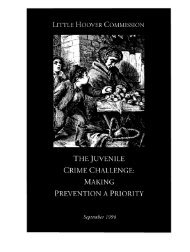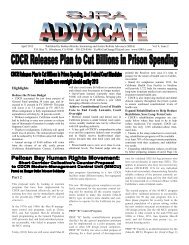Jailhouse Lawyer's Handbook - Sentencing and Justice Reform ...
Jailhouse Lawyer's Handbook - Sentencing and Justice Reform ...
Jailhouse Lawyer's Handbook - Sentencing and Justice Reform ...
You also want an ePaper? Increase the reach of your titles
YUMPU automatically turns print PDFs into web optimized ePapers that Google loves.
violated the constitution when they transferred a<br />
prisoner in response to letters he had written to a<br />
journalist. The letters mentioned the prisoner’s view<br />
that the proposed prison regulations would lead to<br />
prison riots. The court found that since there was no<br />
security risk, the transfer was unreasonable.<br />
Prison officials are permitted to ban petitions, like those<br />
asking for improvements in prison conditions, as long<br />
as prisoners have other ways to voice their complaints.<br />
Duamutef v. O’Keefe, 98 F.3d 22 (2d Cir. 1996).<br />
Officials can ban a prisoner from forming an<br />
association or union of inmates, because it is reasonable<br />
to conclude that such organizing activity would involve<br />
threats to prison security. Brooks v. Wainwright, 439 F.<br />
Supp. 1335 (M.D. Fl. 1977). In one very important<br />
case, the Supreme Court upheld the prison’s ban on<br />
union meetings, solicitation of other prisoners to join<br />
the union, <strong>and</strong> bulk mailings from the union to<br />
prisoners, as long as there were other ways for<br />
prisoners to communicate complaints to prison officials<br />
<strong>and</strong> for the union to communicate with prisoners. Jones<br />
v. North Carolina Prisoners’ Labor Union, Inc., 433<br />
U.S. 119 (1977).<br />
(c) Limits on Censorship of Mail<br />
The Basics: The prison usually can’t stop you from<br />
writing whatever you want to people outside the prison.<br />
The prison can keep other people from writing you<br />
things it considers dangerous. Prison guards can look<br />
in your letters, to make sure there is no contrab<strong>and</strong><br />
inside.<br />
The First Amendment also protects your right to send<br />
<strong>and</strong> receive letters. Until 1989, prison officials were<br />
required to meet a relatively strict test to justify their<br />
needs <strong>and</strong> interests before courts would allow them to<br />
interfere with mail. Today, the court still uses this test<br />
for outgoing mail, but allows prison officials more<br />
flexibility in controlling incoming mail.<br />
In order to censor the letters you send to people outside<br />
the prison, prison officials must be able to prove that<br />
the censorship is necessary to protect an “important or<br />
substantial” interest of the prison. Examples of<br />
important interests are: maintaining prison order,<br />
preventing criminal activity <strong>and</strong> preventing escapes.<br />
The prison officials must be able to show that their<br />
regulations are actually “necessary <strong>and</strong> essential” to<br />
achieving this important goal, not just that the<br />
regulation is intended to achieve that goal. The<br />
regulations cannot restrict your rights any more than is<br />
required to meet the goal. Procunier v. Martinez, 416<br />
U.S. 396 (1974).<br />
This means that prisons cannot restrict or censor your<br />
outgoing mail without meeting the “important” <strong>and</strong><br />
“necessary” test. A prison official cannot censor your<br />
mail just because it makes rude comments about the<br />
prison or prison staff. Bressman v. Farrier, 825 F.Supp.<br />
231 (N.D. Iowa 1993).<br />
However, courts have usually allowed guards to look in<br />
your outgoing mail, especially for contrab<strong>and</strong>. Courts<br />
explain that looking in a letter is different from<br />
censorship. Altizer v. Deeds, 191 F.3d 540 (4th Cir.<br />
1999); Stow v. Grimaldi, 993 F.2d 1002 (1st Cir. 1993).<br />
Some restrictions on outgoing mail are allowed. Courts<br />
have allowed bans on “letter kiting,” which means<br />
including a letter from someone else with your letter, or<br />
sending a letter to someone in an envelope with another<br />
prisoner’s name. Malsh v. Garcia, 971 F. Supp 133.<br />
(S.D.N.Y. 1997). Some courts have allowed prisons to<br />
refuse prisoner correspondence with anyone not on an<br />
approved mailing list, while other courts have not.<br />
Censorship of incoming mail, on the other h<strong>and</strong>, is<br />
governed by the Turner test, which was explained<br />
earlier in this chapter. As you learned earlier, the<br />
Turner test only requires that the regulation in question<br />
be “reasonably related” to a “legitimate” government<br />
interest, as opposed to “necessary” to meet an<br />
“important interest.” This means that while your rights<br />
are still protected to some extent, prisons can put<br />
restrictions on incoming mail for a variety of reasons.<br />
Courts have allowed restrictions on incoming packages<br />
on the grounds that they can easily hide contrab<strong>and</strong> <strong>and</strong><br />
would use up too many prison resources on inspection.<br />
Weiler v. Purkett, 137 F.3d 1047 (8th Cir. 1998).<br />
Courts have also generally upheld restrictions on mail<br />
between prisoners. Farrell v. Peters, 951 F.2d 862 (7th<br />
Cir. 1992).<br />
A prison must follow special procedures to censor your<br />
mail. You should be notified if a letter addressed to you<br />
is returned to the sender or if your letter is not sent. The<br />
author of the letter should have a chance to protest the<br />
censorship. The official who responds to a protest<br />
cannot be the person who originally censored the mail<br />
in question. Procunier, 416 U.S. at 419-20.<br />
Courts have generally upheld limitations on the amount<br />
of postage you can have at one time <strong>and</strong> the amount of<br />
postage they will provide to prisoners who cannot<br />
afford it for non-legal mail. Van Poyck v. Singletary,<br />
106 F.3d 1558 (11th Cir. 1997); Davidson v. Mann, 129<br />
JAILHOUSE LAWYERS HANDBOOK – CHAPTER TWO<br />
14





